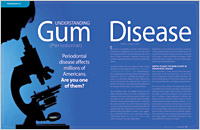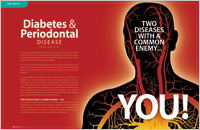It might surprise you to learn that about 70% of adults suffer from some degree of gingivitis, the mildest form of gum disease. In fact, gingivitis is the number one infectious disease in the world.
Why is it important that gingivitis be diagnosed and treated? Gingivitis, if allowed to go untreated, can progress to a more advanced form of gum disease called periodontal disease. When periodontal disease develops, the connective tissue surrounding the teeth and bone become damaged, resulting in the teeth becoming lose. Eventually, the teeth may fall out. Also disturbing is the fact that recent studies have found a link between periodontal disease, gingivitis and an increased risk of developing a heart attack or stroke.
How does gingivitis initially develop? This disease develops when plaque is allowed to build up on the teeth and gum line, causing the gums to become inflamed. This may result in swollen, tender gums that bleed when the teeth are brushed. The gingivitis sufferer may also complain of a chronic bad mouth taste and bad breath. Certain people are more susceptible to gum disease including diabetics and women who are pregnant. If you’re pregnant or suffering from diabetes, it’s important to practice good oral hygiene and have a thorough dental evaluation. Studies have shown that pregnant women who have gingivitis are at a higher risk for low birth weight babies. This is just one more reason to see your dentist during pregnancy.
Break down biofilm with PerioRenew
Unhealthy gums can dramatically impact more than just your smile. Learn more about this revolutionary new gel for gum disease.
sponsored ad
Fortunately, there are treatments available that can help restore your gums and teeth to a more healthy state. Gingivitis can usually be controlled with regular cleanings by your dentist to remove plaque and tartar as well as twice daily home brushings followed by flossing at bedtime. There are also antibacterial mouth washes that can help in the treatment of gingivitis.
Periodontal disease requires more aggressive treatment which may consist of deep cleaning procedures called scaling and root planing. These procedures are carried out to remove tartar and bacteria from below the gum line. In severe cases, certain surgical treatments may be necessary in an attempt to restore the bone that’s been lost due to the disease.
If you’re uncomfortable with dental procedures, you may want to take steps to prevent gingivitis from occurring in the first place. You can begin by flossing daily and practicing good tooth brushing technique. Make sure your toothbrush has firm bristles. Over time, toothbrush bristles may bend and become soft which doesn’t allow for effective plaque removal. Keep your toothbrush in good working order. Don’t forget to floss your teeth once a day to further remove any residual plaque. Finally, see your dentist every 6 months for an evaluation of your teeth and gums.
Now that you know how to protect your gums against gingivitis, give them the attention they deserve. By practicing good oral hygiene, you can keep your teeth and gums healthy for a lifetime.
 The Link Between Heart & Gum Diseases
The Link Between Heart & Gum Diseases
Inflammation has emerged as a factor that is involved in the process of Cardiovascular Disease (CVD), which commonly results in heart attacks and strokes. While the precise role inflammation plays in causing chronic CVD remains an area of intense current investigation, much more is now known. The good news is that, based on current research, we know that if we can reduce the inflammation caused by periodontal disease, we can reduce the risk for heart attacks and strokes… Read Article
 Understanding Gum (Periodontal) Disease
Understanding Gum (Periodontal) Disease
Have your gums ever bled when you brushed or flossed? This most commonly overlooked simple sign may be the start of silent (periodontal) disease leading to tooth loss. Learn what you can do to prevent this problem and keep your teeth for life… Read Article
 Diabetes & Periodontal Disease
Diabetes & Periodontal Disease
Diabetes and periodontal disease are chronic inflammatory diseases that impact the health of millions of people. What you may not know is that diabetes and periodontal disease can adversely affect each other… Read Article
 Warning Signs of Periodontal (Gum) Disease
Warning Signs of Periodontal (Gum) Disease
This article provides the warning signs of periodontal (gum) disease. Don’t wait until it’s too late… Read Article

